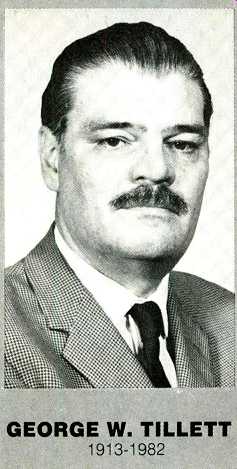
George W. Tillett, Editor of Audio Magazine from December 1969 to May 1973, died after being struck by an automobile on the evening of October 30. He was 69 years old and lived in Clearwater, Florida.
Born Oct. 24, 1913 in Norwich, England, Mr. Tillett's career spanned five decades. He was considered very knowledgeable in several areas of audio engineering and acoustic technology and held three patents, two on loudspeakers, his specialty, and one on phono cartridges. During his term as Chief Editor of Audio, he paid particularly close attention to speaker system developments and to the hi-fi industry's attempts to bring four-channel sound to fruition.
Mr. Tillett had a very subtle sense of humor, and proper understanding of his jests sometimes depended on knowledge of a foreign language French, for example-or on some re cent piece of news, often one that was important but not yet generally well known. Feeling that the audio industry was altogether too serious for its own good, he was the first to interview (invent?) the wildly improbable Prof. I. Lirpa, the middle European inventor and teacher whose eyebrow-raising, picaresque adventures have graced this magazine annually beginning with Mr. Tillett's write-up of the good Professor's invention of the Transpet device in the April 1971 issue.
Aside from his "Equipment Profiles" in Audio, Mr. Tillett was a regular contributor to Stereo Guide Canada, Electronics Australia, Wireless World, Audio Digest and Hi-Fi News and Record Review. Though he pretended that his own writings were not the product of hard work, he was diligent in his efforts. He began reviewing while he was still living in England, in 1956, for Hi-Fi News, for whom he helped produce eight yearbooks. His coverage of amplifiers for Hi-Fi News and for Record News was, he wrote, "a diversion which has lost me many friends." He had a long-term relationship with the French; indeed, "fascination" might be a more accurate term for an intellect which collected bon mots unique to the French language. Written up in Gilbert A. Briggs' Audio Biographies, Mr. Tillett told a story about how, for him, the French language came to be bound up with electronics:
"At school my most precious pos session was a crystal set built into a razor box, which normally lived inside my desk--underneath Euclid if I remember correctly. This tiny radio used to receive stations from as far away as Paris quite well but unfortunately one unhappy day it was confiscated by the French teacher--an act of treachery giving me a prejudice against the French which persisted for some little time." A standard question in Briggs' book was "when and why started in audio," to which he replied, "In 1935 I became more and more interested in music and began to attend concerts regularly particularly in the Albert Hall and the Queens Hall. As a radio engineer it was only natural that I should be interested in trying to improve the means of reproducing music in the home. In 1936 I began to design such equipment and I am still at it." Mr. Tillett held various engineering posts with a number of firms over the course of his career. In 1931, after two years of medical training, he joined Ultra Electric, London; the firm made amplifiers, receivers, speaker systems, etc. By 1936, he was a partner in the firm of Crescent Radio, which was one of the earliest British casualties of World War II. In 1948, he joined Pye Telecommunications as Engineer in charge of VHF projects in London, which experience was to prove useful when FM broadcasting began in England some time later.
In 1951 Mr. Tillett joined Armstrong Wireless and Television as Chief Engineer and was appointed to the Board of Directors in 1953. In the following year he was named Chief Audio Engineer of Decca Radio and Television, where Arthur Haddy was working on a carrier system for stereo on disc recordings. In 1958 he joined the Heathkit division of Daystrom as Chief Engineer, spending eight years with the kit manufacturer before joining Wharfedale as Technical Director. Two years later, Mr. Tillett came to the United States as Chief Engineer at Fisher Radio's facility in central Pennsylvania, where he set up the firm's loudspeaker manufacturing plant. Later becoming Executive Vice President of Audio Dynamics Corp. in Connecticut, Mr. Tillett designed the 303-AX speaker system, which received very high ratings from reviewers both in and outside the audio industry.
Following his stint in Audio's Editorial Chair, Mr. Tillett moved to Massachusetts as Vice President--Engineering for Epicure. In 1975, he moved to Florida, establishing himself as a hi-fi writer, "leaving behind the frustrations and worries of engineering."
He is survived by his wife, Pat, a daughter, Elizabeth, and a son, Richard.
-E.P.
It is with great sadness I note the passing of my good friend George W. Tillett, former Editor of Audio. George was a proper British gentleman, with the emphasis on "gentle." He had a sort of "Mr. Chips" flavor to his nature, as well as a wry sense of humor that endeared him to his friends.
His abiding love of music, and his keen and perceptive ear, served him well in his design work on loudspeakers, and his lifelong involvement in audio. We will all miss him.
-Bert Whyte
( adapted from Audio magazine, Feb. 1983)
Also see:
Coda--Richard C. Heyser (June 1987)
= = = =